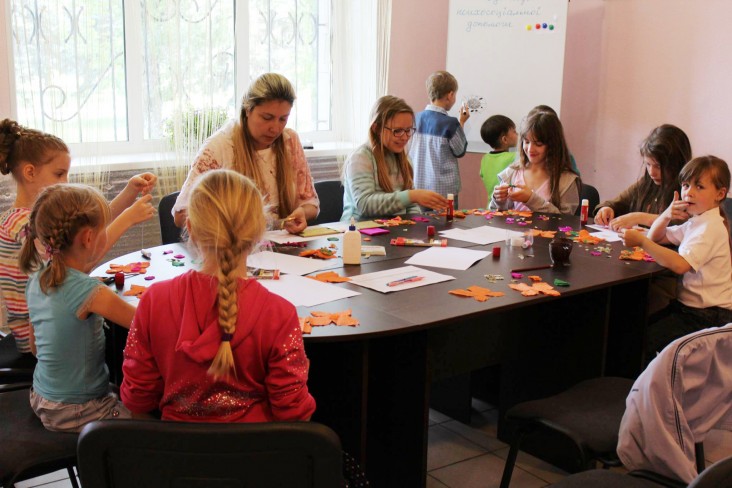
March 2017—As David* starts drawing an aircraft on the whiteboard, he is closely observed by Marina Simbruh, a child psychologist at the Nasnaha Center of Psychosocial Support in Druzhkivka, a small city in eastern Ukraine. The Nasnaha Center helps children and their parents that fled the ongoing conflict in the Donbas region.
David, an 8-year-old, is fond of airplanes and ships. He shows them to his friends and can discuss them for hours, explaining in detail how they work. Simbruh pays attention to what colored pencils David takes first when he draws and observes his behavior as part of the group.
“Our task as psychologists is to support a child to overcome his fears [about his family’s dislocation] with the help of his parents,” says Simbruh.
David is one of the most frequent visitors to the Nasnaha Center. After fleeing their hometown in eastern Ukraine, his parents are making a new life in Druzhkivka. They turned to the Nasnaha Center because they saw that David struggled after his separation from his old home and friends.
Before the conflict, there were only two NGOs providing services for disadvantaged people in Druzhkivka, a town that felt the violence early on with shelling and firefights and is finally undergoing a slow revival. Despite their best efforts to serve residents, these NGOs could not keep up when people running from the conflict began settling in Druzhkivka. Psychosocial support was needed for both adults and children.
With USAID support, the Nasnaha Center opened its doors in Druzhkivka at the end of May 2016 and received over 600 clients in its first nine months of operation.
“Surprisingly, we do not really need to motivate people to come to our center,” says Iryna Tkach, the center coordinator. “Parents often bring their kids with a lot of enthusiasm, and they trust in the specialists working here.”
In addition to expressing themselves through drawings, children older than 4 years of age have an opportunity to attend psychosocial support groups, where center psychologists use a variety of techniques.
Nasnaha Center specialists received USAID-sponsored orientation training on mental health and psychosocial support for families in eastern Ukraine. The training taught participants how to implement psychosocial services in a manner consistent with Inter-Agency Standing Committee Guidelines for Mental Health and Psychosocial Support in Emergency Settings. The center plans to deliver additional training on various topics, such as group dynamics and professional burnout.
Many Nasnaha Center staff are themselves internally displaced persons, so they understand the challenges of living and working in the difficult conditions common in conflict-affected regions. They uniquely understand what children like David have survived, and what it will take to ensure their mental well-being.
In addition to helping those impacted by the conflict in eastern Ukraine, the USAID project, which runs from September 2015 through August 2017, increases coordination between NGOs and government service agencies, and provides training to the mental health and psychosocial sectors, including how to identify individuals who require specialized mental health care services (e.g., those suffering from trauma). In cooperation with the National University of Kyiv-Mohyla Academy, the project develops and accredits training programs in psychosocial support for organizations providing such assistance.
*Full name withheld to protect privacy.
LINKS
Follow @USAIDUkraine, on Facebook







Comment
Make a general inquiry or suggest an improvement.